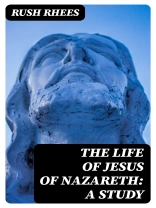In ‘The Life of Jesus of Nazareth: A Study, ‘ Rush Rhees presents a thoughtful and rigorous examination of the historical and theological dimensions of Jesus’ life. With a blend of philosophical inquiry and scholarly analysis, Rhees engages critically with biblical narratives, interpreting them within their socio-cultural context. This work is marked by a concise yet profound literary style, characteristic of mid-20th century theological scholarship, where questions of faith intersect with the quest for historical accuracy, challenging readers to consider the complexities surrounding the life of Jesus. Rush Rhees, a prominent philosopher and theologian, was deeply influenced by his engagement with figures such as Ludwig Wittgenstein and the Analytic tradition. His academic pursuits, particularly in the realms of ethics and religious philosophy, informed his perspective on Jesus as not only a religious figure but also a profound moral teacher. Rhees’ search for meaning through the historical Jesus reflects his commitment to bridging philosophical thought with theological inquiry, a testament to his rich intellectual background and personal faith journey. For readers seeking a deeper understanding of Jesus that transcends mere religious dogma, Rhees’ study serves as a compelling resource, provoking both intellectual and spiritual contemplation. This work is essential for scholars of theology, philosophy, and history alike, inviting them to explore the profound impact of Jesus of Nazareth on both individual lives and broader societal implications.
Об авторе
Rush Rhees (1860-1939) was a prominent figure in theological scholarship and education, though he is often overshadowed by his more famous namesake, the philosopher of the same name. As a theologian, his contributions lie mainly in historical Jesus research and the interpretation of the New Testament. His seminal work, ‘The Life of Jesus of Nazareth: A Study, ‘ delves deeply into the historical context and analysis of Jesus’s life, portraying a picture that aims at both scholarly rigor and faithfulness to Christian traditions. Rhees’s approach to scriptural texts is marked by careful historical critiquing, employing the methods of source criticism that were becoming increasingly important in biblical scholarship during his time. Rhees was a product of an era that sought to reconcile faith with reason, and his literary style reflects the empirical tendencies of late 19th and early 20th-century theology, characterized by a meticulous examination of documentary evidence while maintaining theological sensibilities. His work remains a valuable resource for students of theology, history, and anyone interested in the scholarly pursuit of understanding the life and times of one of history’s most influential figures, Jesus of Nazareth.












